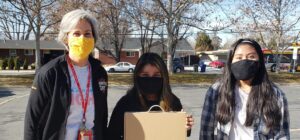The Grassroots Leadership Team at United Way of Salt Lake works to engage community members in conversations about their experiences to create a system where the experiences of those most impacted by issues are guiding the solutions. They do this by first completing community-based research projects to illuminate the stories of those in our communities, then developing actions within the community and institutions to make lasting change. During their fellowship with the Grassroots Leadership team, Salvador Oregon-Torres and Rosie Ojeda organized a project focused on discovering how to best support undocumented students in Utah as they navigate high school and college.
INTRODUCTION:
During the Fall 2020 Grassroots Organizer Fellowship, Fellows Salvador and Rosie conducted a study to understand the experiences of undocumented students.
Salvador is a student at Utah Valley University, studying Political Science with a minor in American Sign Language. He was born in Mexico and moved to the U.S when he was one year old. Salvador is a part of the undocumented community.
Rosie is a Ph.D. student in the Department of Education, Culture, and Society at the University of Utah. She is a former English teacher who worked with immigrant students, many of whom were undocumented. Because of this experience, she has supported the undocumented community for many years.
Since both of us were involved with the undocumented community prior to the fellowship, we decided to focus our research project on the experiences of undocumented students preparing for and navigating higher education in Utah.
According to the Migration Study Institute, in 2018 the state of Utah had an estimated 79,000 undocumented immigrants, an estimated 10,000 of whom were college-aged (ages 18–24). 3,000 of those college-aged students were enrolled in school in the state of Utah, leaving 7,000 unenrolled in school. Salt Lake Community College has the largest undocumented student population in the state, followed by Utah Valley University with the second largest population and the University of Utah with the third.
The study, titled UndocuScholars: Path to Higher Education, engaged 14 participants ranging in age from 18 to 30 years old. All the participants were current or former university students and included individuals with and without DACA (Deferred Action for Childhood Arrivals). To gather data, we interviewed each participant for one hour. We then transcribed the interviews and coded the interviews for themes. The themes that emerged from the interview were: Documentation Status, Power Dynamics, and Resources/Support.
Findings
Our findings indicated that, overall, undocumented students face additional stress due to their documentation status — being undocumented directly affects students’ mental health. Additionally, one key finding from the interviews was the importance and nuance of language when identifying undocumented students. All the participants shared that their undocumented student experience was not validated in high school or college and that there is a need for more support from educators. We include quotes illustrating these findings below.
Mental Health
Our first theme, mental health, was clearly important to the participants. Two current university students shared fears of their parents being deported due to not having any sort of legal protection.
This shows how the individuals’ documentation status affects their mental health. These students worry about their safety and that of their families. This fear also showed up in folks who are part of mixed-status families – families in which some individuals have DACA but their parents or siblings do not.
Power Dynamics of Language
Our second theme, power dynamics of language, demonstrated the importance of nuance and compassion when discussing documentation status. One recent graduate admitted to feeling pressure from being labeled a “dreamer.” They went on to explain how using the term “dreamer” can idealize students who fit specific criteria and demonize those who do not, enacting power dynamics within the undocumented community. Because the language used can make students feel vulnerable and unsupported, it is important to be careful and intentional in the way we discuss undocumented students.
Resources/Support
Our third theme, resources and support, shows the need for more targeted resources to be made available to undocumented students in both high school and college.
One recent graduate expressed a wish that the school provided resources not centered solely around education, revealing a need for targeted resources that address issues beyond school. These resources could include things like legal aid for deportations, which would help address real and valid concerns that students face. To help more students succeed, schools need to provide services that help eliminate stresses that originate outside school but still impact academic performance.
Another participant told a story about a chance encounter with a college advisor who was temporarily assigned to their high school. The student was able to get the help they needed to apply for college and stressed that the help came not from a school employee, but from an outsider who was not employed by the school.
Students should not have to rely on chance encounters with temporary staff to receive the support they need to attend college. Students who immigrate at an older age often do not know what the high school completion process is, much less how to prepare to attend a four-year college or university. Schools need to provide reliable and sustainable solutions to ensure students are guided through the college application process.
Recommendations
At the end of the cycle, we invited the participants of the study to discuss our findings. During that meeting, we discussed the best way to share our findings as well as their concerns with the project and its future. Based on the experiences shared by participants in this study, we have several recommendations.
High School
-
- High school educators need to know more about the experiences of undocumented students and they need to provide targeted resources and support to these students. Many students we spoke with participated in Latinos in Action, a course that encourages Latinx students to give back to their communities by volunteering and helps them prepare for higher education. Unfortunately, from our study, we learned that the course served as a resource for students only if they had a teacher who was aware of Latinx struggles. Schools need to strategically hire Latinos in Action teachers who are invested in, part of, and deeply committed to the Latinx community so students can be guaranteed a valuable experience in the course.
- Teachers can use community-building exercises, restorative approaches, and check-in on students to create classroom communities. One student spoke about their ESL class specifically, saying that the course created a sense of community among students that they did not feel in other classes. All classes should create a sense of community for students.
- Counselors should be trained on how to support undocumented students. They should know about state and federal laws that affect undocumented students. Additionally, it would be helpful if schools normalized and encouraged all students to share funding opportunities and resources for undocumented students, removing the added anxiety that comes from having to ask counselors for resources.
- Schools be required to provide translation/interpretation services for students and their families. One student shared that they often had to act as a translator for their parents. It is inappropriate for schools to ask students or even teachers to translate. Being bilingual does not qualify someone to translate. If schools hired professional translators, it would show non-English speaking families that the school values their languages and is prepared to support students who are learning English.
University
- Colleges and universities should show more support for their undocumented students by speaking out on national issues that affect their students. For example, multiple participants mentioned that when the previous administration was going to ban international students, colleges and universities seemed to “bend over backwards” to find a way to keep the international students. However, when the supreme courts were deciding on DACA, schools released the same general blanket statement that they supported students without taking any action to demonstrate that support.
- Colleges and universities should have more funding for undocumented students. The funding should be used for tuition, books, and living expenses, as well as to provide emergency funds for non-school-related issues, such as emergency assistance.
- Colleges and universities should educate their staff about resources available to undocumented students. This includes resources that the school provides as well as external resources, such as legal aid and mental health services.
Community
- The community should have better resources available for students who are undocumented. We would like to see more community organizations provide funding both for academic purposes and for unforeseen circumstances that arise – funding that the undocumented community can access directly and without strings attached.
- Share information about community organizations that provide resources for undocumented students on college, and university, and community websites so students know where they can go. This would also promote organizations like Comunidades Unidas and the University of Utah Dream Center and could encourage people to donate to community funds or volunteer with these organizations.
Conclusion
These recommendations are just a starting point. We acknowledge that not every undocumented student will need these resources, and that we are still missing many the lived experiences of many others. Undocumented students face additional issues and barriers that we still need to learn about. These recommendations are a first step in making sure that undocumented students have the same support and resources as their peers.
Glossary
- Title IV Higher Education Act: National Act that bars undocumented students from accessing federal funds.
- DACA: Known as Deferred Action for Childhood Arrivals allows certain people who came to the U.S. as children and meet several guidelines may request consideration of deferred action for a period of two years. They are also eligible for work authorization. Deferred action is a use of prosecutorial discretion to defer removal action against an individual for a certain period. Deferred action does not provide lawful status.
- Undocumented: Someone who does not have the documentation to prove they are U.S. citizen.
- The Dream Act: A U.S. legislative proposal that grants temporary conditional residency, with the right to work, to qualifying immigrants who entered the U.S. as minors. Led to the term “Dreamer.”
- Dreamer: A person who has lived in the U.S. without official authorization since coming to the country as a minor. People of this description who met certain conditions would be eligible for special immigration status under federal legislation first proposed in 2001.
- HB144: Allows eligible Utah high school graduates the opportunity to attend Utah universities and colleges and have the non-resident portion of their tuition waived.
- Hyperdocumentation: A term coined by Aurora Chang, which means the effort to accrue awards, accolades, and eventually academic degrees to compensate for undocumented status.
- Latinx: A person of Latin American origin or descent residing in the U.S. (used as a gender-neutral or nonbinary alternative to Latino or Latina or Latin@).
Authors:

By Salvador Oregon-Torres, Grassroots Leadership Organizer at United Way of Salt Lake

By Rosie Ojeda, Grassroots Leadership Organizer at United Way of Salt Lake




